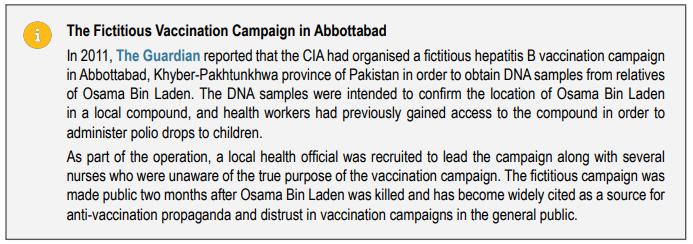When Vaccine Hesitancy Turns Violent
Attacks on Vaccination Campaigns: Blog 2
Published: 06 April 2022

Since 2016, monitoring at Insecurity Insight recorded 93 incidents of critical violence against vaccination campaigns across 16 countries. At least 65 vaccination workers were killed and at least 50 were kidnapped.
Incidents of critical violence against vaccination campaigns have remained a regular feature since 2016, although COVID-19 restrictions may have (at least partly) been responsible for a decrease in incidents in 2020 due to the temporary suspension of vaccination roll outs. According to our data the most frequent targets of these attacks are polio vaccination campaigns.
Vaccination campaigns are particularly frequently violently attacked in Pakistan and Afghanistan, which are the only two countries in the world where polio has remained endemic. However, the phenomenon is widening, targeting vaccination campaigns against other diseases including
COVID-19 (9 incidents), measles (4 incidents), cholera (2 incidents), ebola and malaria (1 incident each).
More recently, the roll out of COVID-19 vaccines has widened the geographical scope of violence against vaccination campaigns to include countries where such incidents were previously less prevalent or virtually non-existent, such as India and France.
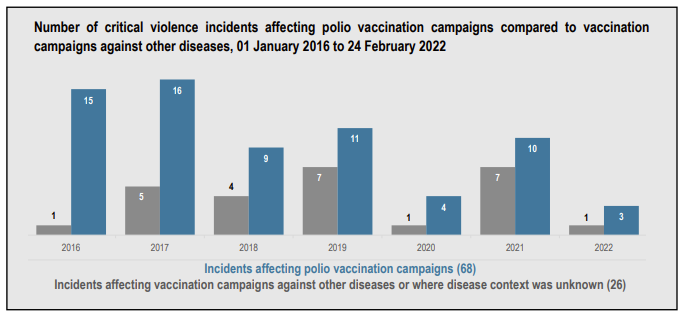
Pakistan: Attacks on Polio Vaccination Campaigns
Vaccination campaigns in Pakistan have frequently been the target of critical violence: our monitoring registered at least 43 violent attacks against vaccination campaigns in Pakistan since 2016, all of which affected polio vaccination campaigns. At least 41 polio vaccination workers have been killed as a result.
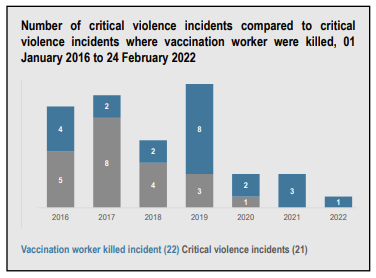
Between January 2016 and February 2022, 2016 was by far the deadliest year in terms of vaccination violence in Pakistan although most vaccination workers were killed in a single event: 15 security guards were killed in a suicide bombing targeting a vaccination centre in Balochistan province.
Most of the incidents of critical violence against vaccination campaigns in Pakistan involved shootings or knife attacks. These often resemble ‘drive-by’ style shootings on or near vaccination sites or targeting vaccination workers when travelling to or from vaccination drives. The perpetrators of these attacks often remain unknown and they are rarely officially claimed by organised groups.
Vaccination workers in Pakistan have also frequently been threatened and physically assaulted by local civilians. These incidents are usually linked to vaccine resistance or refusal by parents or relatives of children receiving polio vaccines or other members of the local community.
Vaccination teams have also been targeted (albeit to a lesser extent) by attacks involving explosive weapons, such as roadside IED’s or the suicide bombing in January 2016. Finally, vaccination workers have also been kidnapped on at least two occasions since 2016.
Although critical violence against vaccination campaigns has been reported in most regions in Pakistan, Khyber-Pakhtunkhwa and Balochistan province have been most affected by violence against vaccination campaigns. Vaccination campaigns in these regions are particularly threatened by (violent) opposition from militant groups, and higher levels of distrust in vaccination campaigns, vaccine hesitancy and vaccine refusal in the local population.1, 2, 3 It is of note however that Balochistan province has been disproportionately affected in terms of the number of vaccination workers killed by the suicide bombing in January 2016 (see map 2).

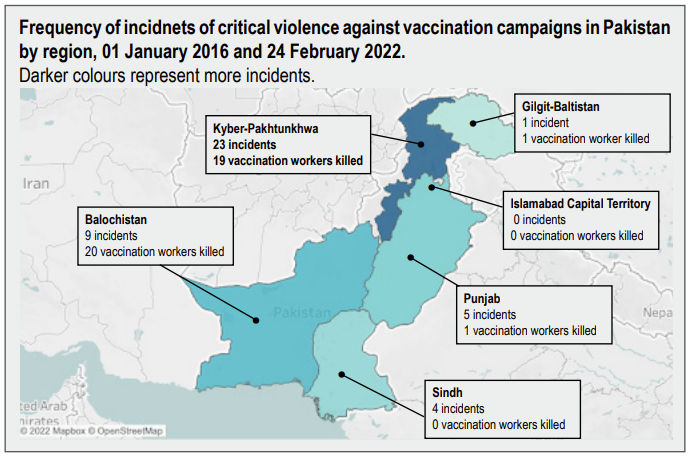
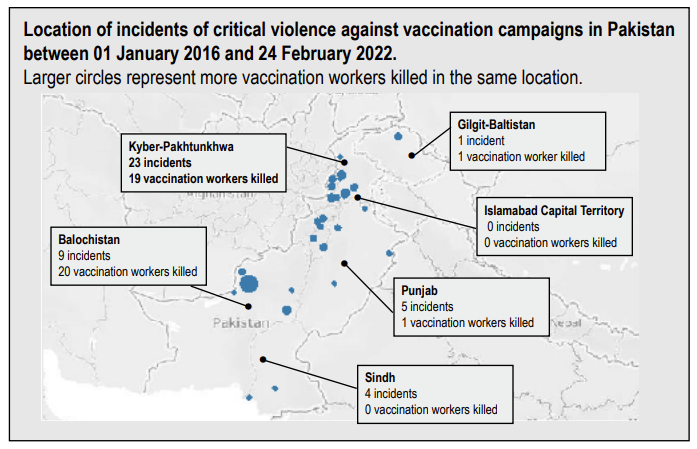
Misinformation, Disinformation and Critical Violence Against Vaccination Workers
Vaccine mis- and disinformation plays an important role in critical violence against vaccination workers and campaigns in Pakistan, and remains a key challenge for vaccination campaigns in the country. Reports in 2011 of a fictitious vaccination campaign intended to locate Osama Bin Laden sparked a surge in anti-vaccination propaganda by militant groups, making various claims including that polio vaccines were unsafe, expired, or included toxic or prohibited ingredients and that vaccination workers were spying for Western governments.4 These claims also led to a general distrust in vaccinations and increased vaccine hesitancy in some regions in Pakistan.5
More recently, the spread of vaccine disinformation and threats towards vaccination campaigns on social media has coincided with a series of violent attacks against vaccination workers in Pakistan. During a nationwide vaccination campaign in April 2019, Insecurity Insight’s Attacks on Health Care Monthly News Brief reported that a group of doctors and nurses were forced to take refuge in a local school when the health clinic they were working in was set on fire. The incident was the first in a series of violent attacks which resulted in at least three vaccination workers, including a polio vaccinator and two police officers guarding the vaccination team, being shot and killed. Another vaccinator was injured after being attacked with a knife, and the vaccination campaign was temporarily suspended as a result.
A recent case study analysis linked the onset of this event to a series of fake videos posted on social media claiming that children had fallen ill or had died after receiving the polio vaccine. Bhattacharjee and Dotto documented that the videos rapidly gained traction online along with various other messages of vaccine disinformation on social media platforms which resulted in hundreds of children being brought into the hospital.6 Some of these messages were also shared by professional news outlets, further amplifying the effects of vaccine misinformation and increasing vaccine refusal numbers.7
One of the pieces of disinformation spread on social media claimed that police officers protecting the vaccination teams were armed to force vaccinations by gunpoint. In the days after the videos gained traction, two police officers guarding the polio vaccination teams were shot and killed in two separate incidents. Such targeted attacks against guards have become a recurring feature of violence against vaccination workers in Pakistan: our monitoring has recorded deadly attacks on at least 29 police guards who were deployed to vaccination campaigns in Pakistan since 2016.
Monitoring Vaccine Disinformation and Threats Towards Vaccination Campaigns
Vaccine disinformation is only one piece of the puzzle which may help explain violence against vaccination campaigns. However, its potential effect has key implications for the safety of vaccination campaigns in Pakistan and other countries, as vaccine disinformation extends to other diseases such as COVID-19.8 Vaccine disinformation has become increasingly prevalent in recent years and is likely to contribute to future hostilities against vaccination workers, especially in contexts where distrust in vaccination campaigns already exists. Monitoring and understanding vaccine disinformation and its effect on violence against vaccination workers is therefore an important future issue in protecting vaccination campaigns.
Footnotes
1 Khan, T.M., & Sahibzada, M.U.K. (2016). Challenges to health workers and their opinions about parents refusal of oral polio vaccination in the KPK Province, Pakistan. Vaccine, 34(18), 2074 - 2781. https://doi.org/10.1016/j.vaccine.2016.03.008
2 Steelfisher, G.K., Blendon, R.J., Guirguis, S., Brule, A., Lasala-Blanco, N., Coleman, M., et al (2015). Threats to polio eradication in high-conflict areas in Pakistan and Nigeria: a polling study of caregivers of children younger than 5 years. The Lancet, Infectious Diseases, 15(10), 1183 - 1192. https://doi.org/10.1016/S1473-3099(15)00178-4
3 Hussain, S.F., Boyle, P., Patel, P. et al. (2016). Eradicating polio in Pakistan: an analysis of the challenges and solutions to this security and health issue. Global Health, 12(63), https://doi.org/10.1186/s12992-016-0195-3
4 Hussain, S.F., Boyle, P., Patel, P. et al. (2016). Eradicating polio in Pakistan: an analysis of the challenges and solutions to this security and health issue. Global Health, 12(63), https://doi.org/10.1186/s12992-016-0195-3
5 Martinez-Bravo, M., & Steggman, A. (2021). In vaccines we trust? The effects of the CIA’s vaccine ruse on immunization in Pakistan. Journal of the European Economic Association, https://doi.org/10.1093/jeea/jvab018
6 Bhattacharjee, S., & Dhotto, C. (2020). Vaccine case study: Understanding the effect of polio vaccine disinformation in Pakistan. Available from https://firstdraftnews.org/long-form-article/first-draft-case-study-understanding-theimpact-of-polio-vaccine-disinformation-in-pakistan/
7 Ittefaq, M., Abwao, M., & Rafique, S. (2021). Polio vaccine misinformation on social media: turning point in the fight against polio eradication in Pakistan. Human Vaccines and Immunotherapeutics, 17(8), 2575-2577. https://doi.org/10.1080/21645515.2021.1894897
8 Ali, I. , Sadique, S., & Ali, S. (2021). COVID-19 and vaccination campaigns as “Western plots” in Pakistan: Government policies, (geo)-politics, local perceptions, and beliefs. Frontiers in Sociology, https://doi.org/10.3389/fsoc.2021.608979
A PDF of this blog post is available here.
New Blog: Attacks on Vaccination Campaigns

Several years ago, polio vaccinators in Quetta, Pakistan were shook by the murder of two colleagues. Armed men on a motorcycle shot a mother and daughter in a ‘drive-by’ style shooting as they were administering polio drops to children. Both women died on their way to hospital.
This attack is not an isolated incident. Vaccinators working on polio, cholera, measles and Ebola vaccination campaigns have often been the target of threats and violence in Pakistan, Afghanistan, the Central African Republic, Mali, Somalia, and South Sudan. Since 2020, misinformation, fear and polarisation surrounding COVID-19 vaccinations have resulted in vaccination centres around the world being vandalised or set on fire. COVID-19 vaccination workers have been threatened and assaulted, including in countries not at war such as India, Malta, and New Zealand. These attacks have devastating effects on public health measures, forcing the closure of vaccination centres or the suspension of vaccination campaigns and leaving communities vulnerable to serious disease.
Since 2016, our monitoring identified over 90 incidents of violence against vaccination workers and campaigns in 17 countries. At least 68 vaccination workers have been killed and vaccination campaigns were frequently suspended as a result.
This new Attacks on Vaccination Campaigns blog analyses Insecurity Insight’s data on attacks to health care to explore where they took place, who was affected, who was responsible, how these attacks may have changed in recent years, and how they relate to public health and politics. The analysis will bring together data from public sources and verified incidents shared by Aid in Danger partner agencies to provide a unique perspective on who is at risk and how vaccination campaigns could be made safer.
Whether you are a health worker, an academic or interested in public policy on vaccines, subscribe or check back here for further updates.
Interactive global map
You can explore some of these incidents on our ‘Attacked and Threatened’ interactive global map. How to use the map:
- Go to map.insecurityinsight.org/health.
- Select ‘vaccination’ on the left side of the dashboard to show incidents on the map.
- Countries are shaded by the number of reported incidents, with darker shadings representing more incidents.
- Click on a country for an incident summary.
- Zoom in to see the location of a specific incident.
- Click on a square for a brief description.
Visit our website, join our mailing list, follow us on Twitter. Help support our work by sharing this resource.
